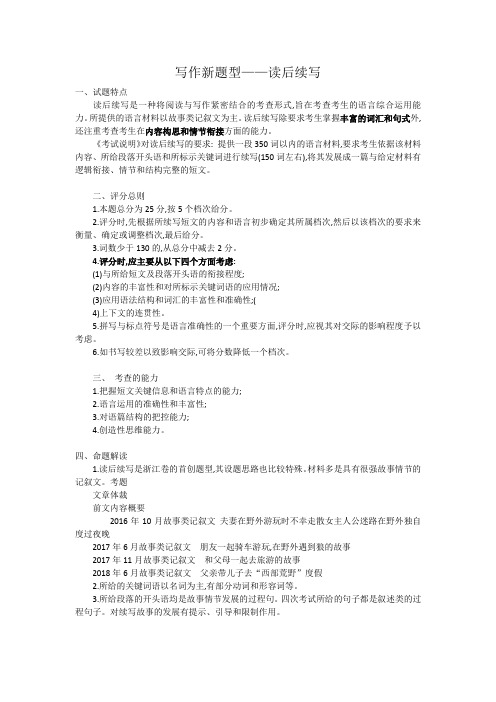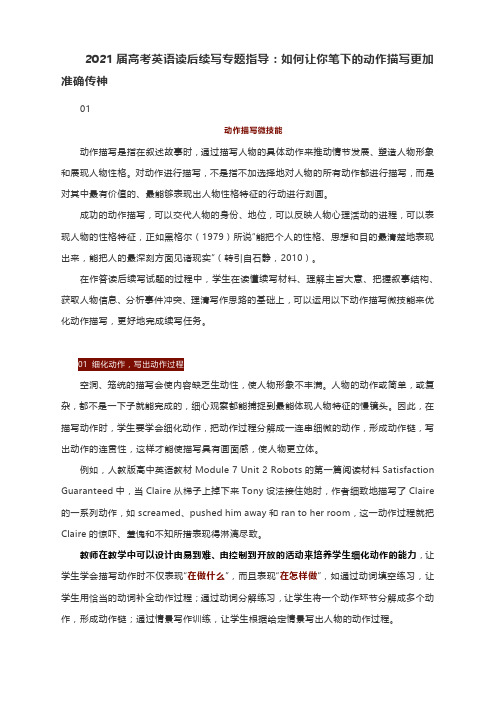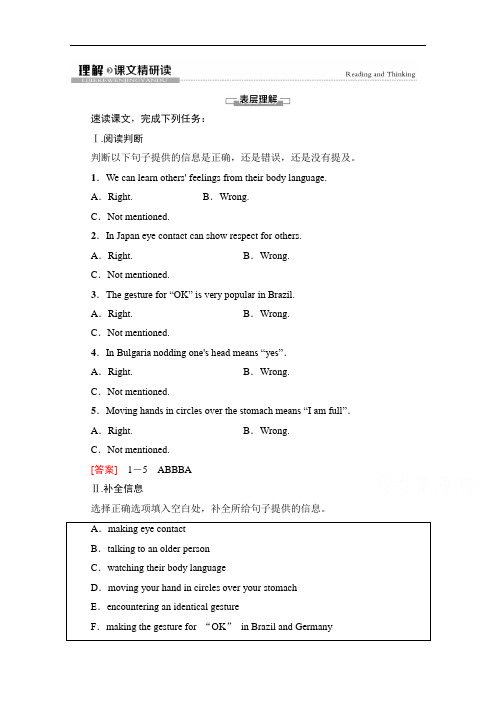写作微技能之句子提升(2021年高中英语人教版
- 格式:docx
- 大小:18.93 KB
- 文档页数:2

写作新题型——读后续写一、试题特点读后续写是一种将阅读与写作紧密结合的考查形式,旨在考查考生的语言综合运用能力。
所提供的语言材料以故事类记叙文为主。
读后续写除要求考生掌握丰富的词汇和句式外,还注重考查考生在内容构思和情节衔接方面的能力。
《考试说明》对读后续写的要求: 提供一段350词以内的语言材料,要求考生依据该材料内容、所给段落开头语和所标示关键词进行续写(150词左右),将其发展成一篇与给定材料有逻辑衔接、情节和结构完整的短文。
二、评分总则1.本题总分为25分,按5个档次给分。
2.评分时,先根据所续写短文的内容和语言初步确定其所属档次,然后以该档次的要求来衡量、确定或调整档次,最后给分。
3.词数少于130的,从总分中减去2分。
4.评分时,应主要从以下四个方面考虑:(1)与所给短文及段落开头语的衔接程度;(2)内容的丰富性和对所标示关键词语的应用情况;(3)应用语法结构和词汇的丰富性和准确性;(4)上下文的连贯性。
5.拼写与标点符号是语言准确性的一个重要方面,评分时,应视其对交际的影响程度予以考虑。
6.如书写较差以致影响交际,可将分数降低一个档次。
三、考查的能力1.把握短文关键信息和语言特点的能力;2.语言运用的准确性和丰富性;3.对语篇结构的把控能力;4.创造性思维能力。
四、命题解读1.读后续写是浙江卷的首创题型,其设题思路也比较特殊。
材料多是具有很强故事情节的记叙文。
考题文章体裁前文内容概要2016年10月故事类记叙文夫妻在野外游玩时不幸走散女主人公迷路在野外独自度过夜晚2017年6月故事类记叙文朋友一起骑车游玩,在野外遇到狼的故事2017年11月故事类记叙文和父母一起去旅游的故事2018年6月故事类记叙文父亲带儿子去“西部荒野”度假2.所给的关键词语以名词为主,有部分动词和形容词等。
3.所给段落的开头语均是故事情节发展的过程句。
四次考试所给的句子都是叙述类的过程句子。
对续写故事的发展有提示、引导和限制作用。

2021届高考英语读后续写专题指导:如何让你笔下的动作描写更加准确传神01动作描写微技能动作描写是指在叙述故事时,通过描写人物的具体动作来推动情节发展、塑造人物形象和展现人物性格。
对动作进行描写,不是指不加选择地对人物的所有动作都进行描写,而是对其中最有价值的、最能够表现出人物性格特征的行动进行刻画。
成功的动作描写,可以交代人物的身份、地位,可以反映人物心理活动的进程,可以表现人物的性格特征,正如黑格尔(1979)所说“能把个人的性格、思想和目的最清楚地表现出来,能把人的最深刻方面见诸现实”(转引自石静,2010)。
在作答读后续写试题的过程中,学生在读懂续写材料、理解主旨大意、把握叙事结构、获取人物信息、分析事件冲突、理清写作思路的基础上,可以运用以下动作描写微技能来优化动作描写,更好地完成续写任务。
01空洞、笼统的描写会使内容缺乏生动性,使人物形象不丰满。
人物的动作或简单,或复杂,都不是一下子就能完成的,细心观察都能捕捉到最能体现人物特征的慢镜头。
因此,在描写动作时,学生要学会细化动作,把动作过程分解成一连串细微的动作,形成动作链,写出动作的连贯性,这样才能使描写具有画面感,使人物更立体。
例如,人教版高中英语教材Module 7 Unit 2 Robots的第一篇阅读材料Satisfaction Guaranteed中,当Claire从梯子上掉下来Tony设法接住她时,作者细致地描写了Claire 的一系列动作,如screamed、pushed him away和ran to her room,这一动作过程就把Claire的惊吓、羞愧和不知所措表现得淋漓尽致。
教师在教学中可以设计由易到难、由控制到开放的活动来培养学生细化动作的能力,让学生学会描写动作时不仅表现“在做什么”,而且表现“在怎样做”,如通过动词填空练习,让学生用恰当的动词补全动作过程;通过动词分解练习,让学生将一个动作环节分解成多个动作,形成动作链;通过情景写作训练,让学生根据给定情景写出人物的动作过程。

速读课文,完成下列任务:Ⅰ.阅读判断判断以下句子提供的信息是正确,还是错误,还是没有提及。
1.We can learn others' feelings from their body language. A.Right.B.Wrong.C.Not mentioned.2.In Japan eye contact can show respect for others.A.Right. B.Wrong.C.Not mentioned.3.The gesture for “OK” is very popular in Brazil.A.Right. B.Wrong.C.Not mentioned.4.In Bulgaria nodding one's head means “yes”.A.Right. B.Wrong.C.Not mentioned.5.Moving hands in circles over the stomach means “I am full”.A.Right. B.Wrong.C.Not mentioned.[答案]1-5ABBBAⅡ.补全信息选择正确选项填入空白处,补全所给句子提供的信息。
A.making eye contactB.talking to an older personC.watching their body languageD.moving your hand in circles over your stomach E.encountering an identical gestureF.making the gesture for “OK”in Brazil and Germany1.We can learn a lot about what people are thinking by.2.For example, —looking into someone's eyes—in some countries is a way to display interest.3.In Japan, it may demonstrate respect to look down when .4.In France, a person may interpret it as meaning zero.5.However, you should avoid , as it is not considered polite.6.A good way of saying “I am full” is after a meal.[答案]1-6CABEFDⅢ.表格填空LISTENING TO HOW BODIES TALKThe general introduction Both words and body language are used to 1.express thoughts and opinions.We can learn a lot about others' thoughts by watching 2.their body language.The body language in different cultures Body language 3.varies from culture to culture.The crucial thing is using body language in a way that is 4.appropriate to the culture you are in.T he gesture for “OK”It has different meanings in different cultures.In Japan it means 5.money.In France, it means zero.However, it is not considered 6.polite in Brazil and Germany.The gestures for “yes”and “no”In general, shaking one's head means “no”, and nodding means “yes”.But in Bulgaria and southern Albania, they have the 7.opposite meaning.The gestures with the same meaning Placing your hands together and resting them on the side of your head while closing your eyes means “sleep”.Moving your hand 8.in circles over your stomach after a meal means “I am full”.The body language with different uses A smile can help us 9.get through difficult situations, find friends in a world of strangers, and 10.break down barriers.We can use a smile to apologise, to greet someone, to ask for help, or to start a conversation.细读课文,完成下列任务:Ⅰ.主旨匹配1.Para.1A.Body language varies in differentcultures.2.Para.2 B.Body language can show ourfeelings.3.Para.3 C.The gestures for “yes” and “no”are different.4.Para.4 D.The different meanings of “OK”.5.Para.5 E.Smiling has many different uses. 6.Para.6 F.Some gestures with the samemeaning.[答案]1-6BADCFEⅡ.阅读1.In which country do people disprove of eye contact?A.In America.B.In Japan.C.In many Middle Eastern countries.D.In many Asian countries.2.What does the gesture for “OK” mean in Japan?A.Money.B.Zero.C.Politeness. D.Respect.3.What do people in Russia usually do when meeting friends?A.Bow from the waist.B.Kiss them on the cheek.C.Shake hands.D.Nod the head.4.Which of the following has many different uses?A.Moving hands. B.Holding arms.C.Crying. D.Smiling.[答案]1-4CABDⅢ.概要写作微技能概要写作微技能(二)——查找主题句并删除细节找出文中每段的主题句,保留主体部分,删除细节Para.1:We use both words and body language to express our thoughts and opinions in our interactions with other people.→保留主体部分,删除细节后为:Words and body language are used to express thoughts and opinions.Para.2:Just like spoken language, body language varies from culture to culture.→保留主体部分,删除细节后为:Body language varies from culture to culture.Para.3:The gesture for “OK” has different meanings in different cultures.→保留主体部分,删除细节后为:The “OK” gesture has different meanings.Para.4:Even the gestures we use for “yes” and “no” differ around the world.→保留主体部分,删除细节后为:The gestures for “yes” and “no” differ.Para.5:Some gestures seem to have the same meaning everywhere. →保留主体部分,删除细节后为:Some gestures have the same meaning.Para.6:Some body language has many different uses.Perhaps the best example is smiling.→保留主体部分,删除细节后为:Smiling has many different uses.。

巧用读后续写微技能,提升学生英语写作能力作者:周玉霞来源:《教育·综合视线》2021年第01期读后续写作为江苏高考的新题型,对许多学生来说是比较陌生且具有挑战性的。
它要求学生根据一段350词以内的语言材料和所给的段落开头语进行150词左右的续写,对学生的内容创造和语言运用提出了高要求。
一篇好的读后续写要求学生在续写时要注重前后内容衔接的连贯性、故事发展的合理性、内容结构紧凑和语言丰富准确。
而在实际操练中,学生普遍存在以下典型问题:读写严重脱节,情节不当;细节描写单调,空洞无物;语法句式简单,泛善可陈;词汇项目有限,词不达意;语言错误频现,中国式英语比比皆是。
笔者在读后续写微技能教学中,主要从细节描写、高级句式等方面帮助学生强化训练,以此提升语言运用能力,更好地完成读后续写任务。
一、在续写内容中增添细节描写,让文章生动具体有人说,艺术的生命在于真实,而艺术的真实又是依靠于细节的真实。
要让续写内容生动具体,可以通过更多感官增添细节描写,让读者能够听到、看到、品尝、触摸和闻到与角色所经历的相同的事物。
细节描写体现在动作、心理、外貌、环境、语言等方面,笔者主要介绍以下四种描写。
1.动作描写。
在指导学生进行动作描写时,一要精准,可以用一系列小动作或含义比较明确的动词使描写具体生动。
二要有过程,可以用一连串的动词展现动作的过程,为文章增添色彩。
如:She went to catch the butterfly.(她去抓蝴蝶)句中没有细节动作描写,显得很平淡。
如果说成:She crept along the path, bent over swiftly and cupped her hands around the butterfly gently.句子用crept(慢慢移动),bent(弯下腰),cupped(使成杯形)三个连贯的动词生动具体地描述了她小心翼翼捕捉蝴蝶的微妙过程,具有极强画面感。


句型篇◆It句型①It will be + some time + before…It won’t be long before humans visit the Mars.②It is + adj./n.+ for sb to do sth.注:形容词表示人物性格特征时,用of sbIt is very important for us to learn computer well, because it has changed our life so much.He said since it was a new model in China, it was impossible to fix it without the right spare parts.(2008年湖北卷)lt is you who have cared for me since I was a little child ,showering(v.倾注) your selfless affection(n.喜爱)on me.③强调句结构:It is + 被强调部分+ that…注:主语、宾语、状语及状语从句可被强调1) It is what Yang Liwei has done that encourages us a lot.2) Those who like reading extensively say it is through reading that we get ourknowledge.④形式主语、宾语1)It seems to me that this experience , together with my education , has given me idea preparation to assume/take the role of in a firm such as yours.在我看来我的经验再加上我的教育背景,使我能够从容地胜任贵公司所提供的职位2)When I heard the news of this activity, it suddenly occurred to me I can invite you to take part in.当我得知这个活动的消息时,我突然想到何不邀请你来参加呢3)May each succeeding year bring you great happiness and prosperity!连接下来的每一年都能给你带来幸福和财富补充:lt is known to us all that +句子What is known to us all is that +句子As is known to all ,+句子众所周知…Worthwhile 只用作形式主语和形式宾语However, the evening makes it all worthwhile.It’s worthwhile doing / to do sthWorth 只用主动做表语主表被Sth is worth + n. / doingIt’s worth (one’s) while doing / to doWorthy 只用被动译作“值得…的”“应受…的”时做表语译作“有价值的”“值得尊敬的”时做定语Sth is worthy of + n. / to be done / of being done◆名词从句注:名词性从句可分为主语从句、宾语从句、表语从句、同位语从句①It would mean a great deal to me to listen to the tape and learn what is coveredin the talk. ( 2004 全国卷Ⅲ)宾语从句②My hometown is no longer what it used to be.表语从句③This experience taught me a lesson that we should be faced with problems bravely.这次经历给了我一个启迪,我们应该勇敢的面对问题同位语从句④I can imagine how great effect you had taken before you want the competition.我可以想象在赢得比赛之前,你付出了多大的努力宾语从句⑤What I've learned from this book is that though life is tough sometimes, as long aswe are determined to rise above difficult circumstances as life can be hopeful and colorful.我从书中学到的道理是,虽然生活有时会很艰难,但只要我们下定决心在困境中崛起,生活就会充满希望,并变得丰富多彩的主语从句、表语从句⑥I'm writing to tell you that our school is going to the donate some Chinesebooks to the Confucius Classroom of your school.我写信是为了告诉你,我们学校将给你校的孔子课堂捐赠一些中文书籍宾语从句◆分词结构注:前后主语一致的省略现在:doing sth 现在:done sth主动被动过去:having done sth 过去:having been done sth①I don’t know about others, but I used to have to work even at weekends doingendless homework and attending classes as well. (NMET 2001)②We’ll mostly stay at home in the evening watching TV, playing games, andmeeting people. (2004 全国卷Ⅱ)③Hearing this, a few people began to run after him.(2004 辽宁卷)④Born in American, Thomas Edison was a great scientist and inventor.(2008年湖南卷)⑤Moved by the kids , I decided to donate all my money to them.⑥Having lost all my old friends,I felt lonely and shy at my new school.⑦Having thought about the situation for a while , I decided to turn to her.⑧Having been told many times,he was still late.◆非谓语动词①To raise everyone's awareness of protecting the environment, We have determined to make Hanfu with outdated newspapers.为了提高大家的环保意识,我们决定用过期的报纸制作汉服不定式作目的状语②Hearing that you want to know more about the transport in Beijing,I feel very pleased to offer you some information about it.听说你想更多的了解北京的交通,我很乐意给你提供一些相关信息分词作状语表示时间,不定式表示原因③Thanks to the books, she finds a way to endure poverty and loneliness, surviving all the difficulties and challenges.因为读书,他找到了忍受贫穷和孤独的方法,经受住了困难和挑战的考验不定式作定语,现在分词作状语表示结果④It tells a story of an old man fishing in the sea for over eighty days.这本书讲述的是一个老人80多天在海上打鱼的故事动名词复合结构作宾语⑤The course, kicking off /starting on February 2, includes colorful activities, ranging from the ABCS of Beijing Opera to actually practicing playing a role in a famous opera.这个课程于2月2日开始,包括丰富多彩的活动,从学习京剧的基础知识到去著名剧院练习扮演角色分词作定语⑥Located in the center of Beijing, the Forbidden City ,regarded as a must-see spot for travels ,is a magnificent and awe-inspring sight.位于北京市中心紫禁城,作为游客们的必去景点,拥有着壮丽的令人惊叹的景色分词作状语和定语⑦As a student who is good at English,I think I am fit for the job and I'd like to make a contribution to making the English Festival a great success.作为一名擅长英语的学生,我认为我非常适合这个工作,我想贡献自己的一份力量,使英语节获得成功动名词作宾语◆状语从句①On the one hand, the price of the food is so high that many students would rather dine out of the school, which may take us more time and bring safety problems. So that 引导结果状语从句另一方面食物的价格太高了,许多同学宁可在校外吃,但是这样会占用我们更多的时间,并且带来安全问题②I can understand your feelings because I once also the had the same unpleasant experience as yours. because,引导原因状语从句我能体会你的心情,因为我也曾有过同样的遭遇③Though he suffers those ups and downs, he never gives up hope. 让步状语从句虽然她经历了起起落落,但她从不放弃希望④Remember to take your umbrella or raincost in case it rains. 条件状语从句记得带上雨伞或者雨衣,以防下雨⑤We plan to take all the books to you this July when we attend the summer camp to be held in your school. 时间状语从句我们决定今年7月份参加你校组织的夏令营时,把这些书带过去⑥If you are unsure what to do, remember the saying " When in Rome ,do as the Romans do." 条件状语从句如果你不确定该做什么,记得入乡随俗这个俗语◆with结构(1) with + 宾语 + 形容词The children were listening to the teacher with their eyes wide open.(表伴随)(2) with + 宾语 + 介词短语The old man used to take a walk with a stick in his hand.(表方式)(3) with + 宾语 + 副词The proud girl walked away with her head up.(表方式)(4) with + 宾语 + 现在分词Mary felt very shy with so many eyes looking at her.(表原因)(5) with + 宾语 + 过去分词If you sit looking away from a person, or with your back turned, you are saying you are not interested in that person. (表方式)(6) with + 宾语 + 不定式With too much work to do the next day, he felt anxious and didn’t sleep well.(表原因)一般说来,with 复合结构放在句末多表示伴随状况;若放在句首,则多表示“原因”或“条件”,例如:With her mother away from home, the little girl felt lonely. 由于她妈妈不在家,这个女孩感到很孤单。
写作微技能之句子提升
一、抽象名词的使用
运用抽象名词使句子更加精炼,但语意却更加明确了,这样的写作方法在表达复杂句意的时候会显得尤为重要和实用。
1. Hearing the news that he had won the first prize, he was very excited.
The news that he had won the first prize filled him with great excitement.
2. He lacks experience, so he is at a disadvantage compared to other employees.
A lack of experience puts him at a disadvantage compared to other employees.
3. If you compare two ways of life carefully, you will find the former is superior to the latter. Careful comparison of two ways of life will show the superiority of the former over the latter.
二、物称主语的使用
名词的高频使用使得英语中多有物称作主语的句子,其实,英语中很多地道表达往往都是物称作主语的。
1. He is so observant that he notices everything.
He is so observant that nothing escapes his attention.
2. I can’t describe how beautiful she is.
Her beauty is beyond description.
3. We drove for two hours and arrived at the Grand Canyon.
A two-hour drive took us to the Grand Canyon.
4. He suddenly remembered that he had left his wallet home.
It suddenly occurred to/struck/ hit him that he had left his wallet home.
5. I will never forget the valuable lesson my grandma taught me.
The valuable lesson my grandma taught me will be rooted in my memory forever.
三、分词作形容词
在英语中,分词的使用是非常广泛的,很多分词已经演变成形容词,比如说interesting, amazed等,这类分词的使用能让英语句子的表达变得更加简便和地道。
1. Patients in hospitals are increasing quickly and will cause problems to medical care system.
An increasing number of patients in hospitals will cause problems to medical care system.
2. Under more and more pressure, he wanted to resign.
Under mounting (逐渐增加的) pressure, he wanted to resign.
3. The wagon which was pulled by a horse lost its balance and fell off the cliff.
The horse-drawn wagon lost its balance and fell off the cliff.
4. When he saw the terrible scene, he froze on the spot and his eyes were wide open.
He froze on the spot, wide-eyed at the horrible scene.
四、实义动态动词
动词可以分为很多类,比如:实义动词、系动词、助动词、情态动词,系动词属于静态动词,而实义动词往往是动态动词,但是实义动词里的使役动词并没有表达太多的含义。
在我们的英语写作中,高频的动词有静态系动词be, 以及使役动词,这会使得文章读起来不够lively,而且也比较拖沓。
所以,我们可以尝试着去将一些静态动词替换为动态动词。
1. Mutual respect is the key to friendship.
Mutual respect maintains friendship
2. My mother always lets me do homework when I arrive home.
My mother always urges me to do homework when I arrive home.
3. The development of technology makes our life more convenient.
The development of technology facilitates ( /fəˈsɪlɪteɪt/促进,使便利) our life.
4. The letter from his parents made him homesick.
The letter from his parents aroused his homesickness.
五、介词
英语中有两百多个介词,因此介词的使用频率是很高的,尤其是在表达稍微复杂一点的意思时,介词就可以发挥巨大的作用。
1. Students are struggling with classes and coping with pressure caused by testing, so they have little time to relax.
With students struggling with classes and coping with pressure from testing, there is not much room for recreation.
2. We chase happiness and equal it with wealth and success, but we don’t notice that the people having those things are not necessarily happier.
We chase happiness and equal it with wealth and success, without noticing that the people having those things are not necessarily happier.
3. While developing tourism, the government also protects wildlife and builds national parks. The protection of wildlife and the creation of national parks go hand in hand with tourist development.
六、连词
汉语属于“意合”语言,其衔接主要是靠句子内部的逻辑联系,而没有明显的外部标志,即少用连词。
而英语是“形合”语言,其衔接主要依靠的就是外部的各类语法标志,因此多用连词。
1.冬天来了,春天还会远吗?
If winter comes, can spring be far behind?
2.万事开头难。
All things are difficult before they are easy._
3.我不能相信他,他不老实。
I can’t place my trust in him, because he is dishonest.
4.努力学习,你迟早会成功的。
Work hard, and you will succeed in time.。